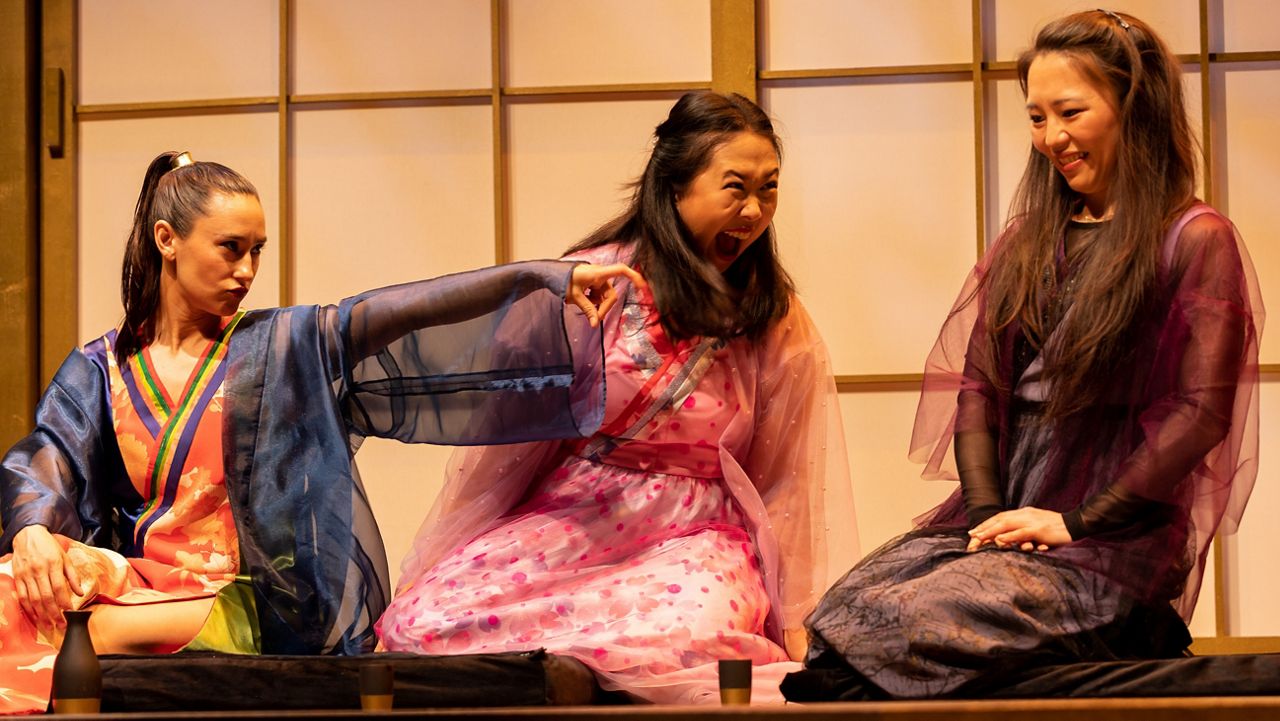PASADENA, Calif. — Picture this — a room full of intelligent and creative Asian American women making art.
“This is awesome,” Cindy Nguyen shouts with the same unbridled enthusiasm she often utilizes in her performance.
What You Need To Know
- During the Heian Period of ancient Japan, ladies-in-waiting were hired to think and write and create, and some of those works still exist, specifically the writings of Murasaki Shikibu
- Playwright Rosie Narasaki says there must have been other women writing over the past few millennia but so few names remain
- The story may be set a thousand years ago, but the language Narasaki uses is youthful and modern
- This is the 31-year-old’s first full-length play to be produced, a co-production of Boston Court Pasadena and Playwrights’ Arena
A thousand years ago in Japan, a gathering of this nature was kind of a thing. During the Heian Period of ancient Japan, ladies-in-waiting were hired to think and write and create, and some of those works still exist, specifically the writings of Murasaki Shikibu, author of "The Tale of Genji" and Sei Shonagon, author of "The Pillow Book."
Playwright Rosie Narasaki says there must have been other women writing over the past few millennia, but so few names remain. “It’s like Sappho and then these two,” she said.
Although historically it’s likely the two women never met, in her play “Unrivaled” Narasaki imagines them both working for the same empress — Empress Teishi played by the effervescent Nguyen. She and Katie Kitani, who plays Murasaki, love the idea of this arts-based culture.
“This was a time in history where money was not the prime currency,” Kitani said, as Nguyen, next to her, mimed a sort of mind-blown reaction. “Literally, the most powerful thing you could have was to be a good poet, a good writer, a good musician.”
The story may be set a thousand years ago, but the language Narasaki uses is youthful and modern. This is the 31-year-old’s first full-length play to be produced, a co-production of Boston Court Pasadena and Playwrights’ Arena. Director Margaret Starbuck read it in 2020 when Narasaki submitted it to Boston Court’s LA Playwrights Open Submission window.
“It was like love at first read,” she recalled. “I was completely obsessed with her dialogue, how contemporary it was, how relatable it was. I remember reading it and thinking, ‘Oh, this is a play about me and my friends.’”
Friends…. who, in this case, are more like frenemies. Of course, there was no social media platform for the two to feud on with fans declaring themselves #TeamSei or #TeamMurasaki, but there is some evidence in Murasaki’s diary.
“She was like, ‘Shonagon thinks she’s so cool, because she can write in Chinese, and she thinks that makes her writing special, but it really just makes her look pretentious’,” Starbuck said.
In fact, researching these women, she couldn’t help but think of how often throughout history and especially in the arts, women are pitted against each other rather than allowed to raise each other up.
“Why? Like why does that have to be?” Starbuck questioned. “Why can’t we just be this like community of women in solidarity with each other? And I think that really applies with women artists.”
As for Narasaki, this moment seems to be written in the stars. Her parents are both in theatre. Her dad appeared in a production of “The Winter People” at Boston Court Pasadena in 2004.
“I think I came out to see it three times because I really loved it,” she remembered.

Her mother had been directed by Jon Lawrence Rivera, artistic director of Playwrights’ Arena, several times. In fact, Narasaki and both of her parents worked with him on a production of Little Women in 2017. She grew up in and around theatre and admits it wasn’t always easy. She watched her parents struggle to find work when work for Asian Americans actors was scarce. At first, she couldn’t understand why they persisted, but eventually, it hit her.
“Just seeing like the community that they had, and all their friends that they would collaborate with, and the art they created,” she said. “I was finally able to appreciate that.”
A lot has changed over the past few decades and while she’s pleased with the progress AAPI artists are making, Narasaki says she remains cynical.
“I feel like it’ll continue to go up and down,” she explained. “I don’t want to feel like,'Oh, everything’s fixed now!’ But I am very excited, especially seeing like what my parents went through in the 90s and stuff like that. It’s very exciting.
Both Boston Court Pasadena and Playwrights’ Arena are dedicated to fostering new works by local playwrights and the actors in Unrivaled are clamoring for more writers of color to be given the stage.
“More people of all diverse backgrounds,” Kitani said.
“Absolutely. Please, please,” Nguyen echoed, adding, “especially if you’re funny.”
Surrounded by the women of this mostly AAPI, mostly female cast and creative team, Narasaki is thrilled to have contributed her voice to what they all hope will be an ever-growing chorus.
“There are lots of things that I get like in my head about, that I’m insecure about,” she admitted, “but I’m like, at least I created a play with three Asian American women in it! That’s a win!”
“A hit play! That is good!” Nguyen stressed. “That is very, very good! And you know, that’s the Asian ‘great’, is very, very good.”
Clearly, there’s no rivalry in this room. Just a mutual appreciation society that the rest of society might take a page from.



